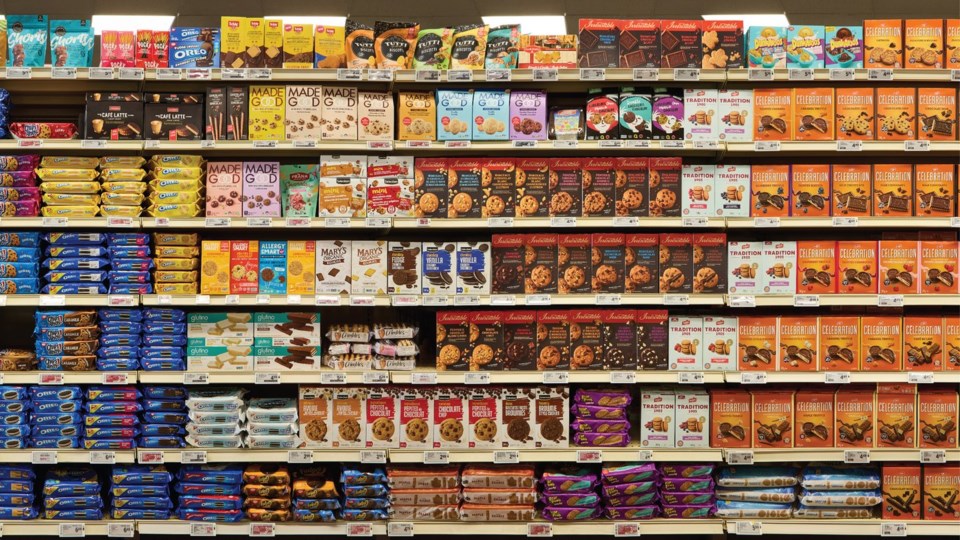Over the past few years, consumers have been buying more private-label products at the grocery store to save money — and the trend may be here to stay.
Amid renewed investment by grocers in their store-branded offerings, studies show many shoppers no longer see store brands as lower quality than name brands.
“For customers, the private brand is becoming not just a knockoff,” said Annie St-Laurent, senior director for Metro’s private-label portfolio.
“The growth is really good in private label.”
Grocers’ in-house brands — like Metro’s Irresistible and Selection, Loblaw’s No Name and President’s Choice, and Sobeys’ Compliments and Panache — tend to be priced lower than their name-brand competitors.
Private-label brands are “having their moment,” according to a report by agriculture-focused co-operative bank CoBank. Shoppers are choosing store brands more often as the recent bout of inflation pushed prices up by double digits in just a few years, and interest-rate hikes added to the pressure.
Retailers are responding to the uptick in interest by introducing new products and allotting more shelf space to their brands, said Peter Chapman, founder of consulting firm SKUFood.
"We're seeing more depth within categories for private label as retailers see it as an opportunity,” he said.
Retailers have also been investing not just in new products, but also in branding and marketing, according to market research firm NielsenIQ.
That’s the case for Metro, which in the coming weeks is launching a refresh of its core private label, Irresistible.
With a new logo, products, packaging and flavours, St-Laurent said Metro is looking to make the brand more visible throughout the store.
“We’re reviewing completely that branding to make sure we are visible, and that the customers are finding our product,” she said.
The rebrand comes as Metro has already been expanding its assortment to meet customer demand for private-label products, adding new formats and price points. Sales growth in private-label products has been outpacing national brands, said St-Laurent — shoppers are more open to trying private-label options these days, and it’s a trend the grocer expects to continue.
For Metro, “this is a priority,” said St-Laurent.
Over the past couple of years, Christy Laverty, from Burlington, Ont., started buying more store brands as prices rose.
Though she’s found some name-brand products are “deal breakers” for her family — Heinz ketchup and Kraft Dinner, for example — Laverty said she’s switched to private labels for many things including canned vegetables, beans and dairy products.
“Why spend another 50 cents on a can of kidney beans when you don't need to?” she said.
Laverty said she’s now always willing to try the private-label version of a product and see whether it’s worth the switch.
She also said her pre-existing notion that private-label food might be lower quality has been challenged.
“I started to kind of recognize that the store brand, private label isn’t necessarily less quality,” she said.
Consumers’ perceptions of private-label foods have improved considerably since the last time interest in store brands surged, according to CoBank, which was around the time of the 2008 recession.
This means the increased share of private-label products in shoppers’ baskets is likely to have more staying power this time around, the report said.
Empire Co. Ltd., the company behind Sobeys, FreshCo, Safeway and other grocers, said in its 2024 annual report that it plans to continue growing and enhancing its portfolio of store brands.
In its 2023 annual report, Loblaw noted that customers' increased focus on value "benefited the Company’s sales due to its strength in private label products, discount banners, and personalized promotions."
The company even launched a new discount grocery banner this year under its No Name brand.
Grocers not only often get a better margin on private-label products but also see them as a sort of “loyalty program” that can keep shoppers coming back, said Chapman.
He thinks retailers will work hard to keep private-label sales strong through new products, marketing, promotions and shelf space.
“I would say there's probably more focus on trying to make sure they do deliver because people are giving them more chances right now,” he said.
The increased competition could actually prompt some name brands to offer more frequent discounts or promotions, Chapman said.
For Victoria-based Kael Campbell, opting for private-label foods has made a big difference in his grocery bill as he shops for his family.
Whether he’s at Costco, Walmart or Thrifty Foods, Campbell said he often notices the prices of store brands are significantly lower for very similar products.
“It really adds up,” he said.
This report by The 91Ô´´ Press was first published Oct. 3, 2024.
Companies in this story: (TSX:MRU, TSX:L, TSX:EMP.A)
Rosa Saba, The 91Ô´´ Press



